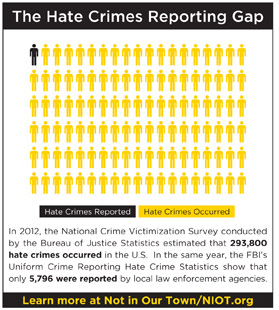Hate and bias crimes, based on race, perceived ethnicity, religion, language, nationality, sexual identity, or immigrant status, are a widespread problem within the United States. In 2012, hate crime estimates are close to 300,000. Less than 6,000 were reported to the FBI.
 This year marks the fifth anniversary of the Matthew Shepard and James Byrd, Jr. Hate Crimes Prevention Act, which gives the federal government the authority to investigate and prosecute crimes against victims targeted because of race, ethnicity, sexual orientation, gender identity, religion, or disability. As we commemorate this victory of federal hate crime legislation, we must also acknowledge that laws and policies alone don’t make our communities safe.
This year marks the fifth anniversary of the Matthew Shepard and James Byrd, Jr. Hate Crimes Prevention Act, which gives the federal government the authority to investigate and prosecute crimes against victims targeted because of race, ethnicity, sexual orientation, gender identity, religion, or disability. As we commemorate this victory of federal hate crime legislation, we must also acknowledge that laws and policies alone don’t make our communities safe.
The Hate Crimes Reporting Gap is the huge disparity between those hate crimes reported to the Federal Bureau of Investigation (FBI) and those that actually occur. Because they are vastly underreported, many communities cannot address a problem they don’t even know exist.
“Underreporting leads to underenforcement, which matters because, as [Attorney General Eric] Holder said, ‘bias-motivated acts of violence divide our communities, intimidate our most vulnerable citizens, and damage our collective spirit,’” wrote the New York Times in an August 2012 editorial. The editorial concluded by saying that “[t]hese acts should be investigated and prosecuted for the broad harm they do to communities, well beyond their individual victims.”
Additional hate crime reporting resources from NIOT.org/COPS: